Begin typing your search...
Don’t take it light, heart burns could be a symptom of GERD
Gastroesophageal Reflux Disease (GERD) a type of digestive disorder, is becoming extremely common, largely due to obesity, say gastroenterologists in the city.

Chennai
It is characterised by a burning sensation and regurgitation of food or sour liquid. GERD occurs when stomach acid or, occasionally, stomach content, flows back into your food pipe (oesophagus). This constant backwash of acid can affect the oesophagus lining, causing it to become inflamed (oesophagitis). Sometimes, the inflammation can wear away the oesophageal lining, causing bleeding, oesophageal narrowing or Barrett’s oesophagus (a precancerous condition).
Dr P Basumani, Consultant Gastroenterologist, Fortis Malar Hospital, says that every day, in the outpatient department, he sees at least two to three patients suffering from GERD. He adds, “We can categorise it as a lifestyle disease. It is prevalent among newborns. It also largely affects the middle aged and those older. Among the elderly population, at least 40 per cent of them suffer from the condition. This is largely due to age that compromises the functions of the oesophagus.”
A lifestyle disorder:
Dr BS Ramakrishna, director-senior consultant - Medical Gastroenterology, SIMS Hospital, says that as with several other health complications, in a majority of people with GERD, the underlying cause is lifestyle related and the numbers of those suffering from GERD is rising. “Obesity or too much fat in the abdomen compresses the stomach and raises its internal pressure, leading to acid reflux. But there is a small section of thin people who also suffer from the condition, due to hiatus hernia (a condition where part of the stomach protrudes into the chest through the diaphragm),” he says.
Dr Basumani says that consumption of fatty food proves to be an assault on the lower oesophageal sphincter — a circular band of muscle around the bottom part of your oesophagus — that relaxes to allow food and liquid to flow down into the stomach. He adds, “In addition to obesity, too much coffee, chocolates, excessive consumption of alcohol and smoking and medications for asthma can also have an impact.”
Complications aplenty:
The longterm implications of GERD are many and these can go on to affect many parts of the body -- from the teeth to the lungs. Dr R Ravi, Head of Department, Gastroenterology, Global Hospitals, says that if left untreated it can lead to acid reflux cancer in some cases. “Some of the other possible implications include ulcers in the oesophagus and difficulty in swallowing. Asthmatic patients will have increase in symptoms and those without asthma can have asthma-like symptoms, and lung infections. Many might also have a change in voice, develop nodules in vocal cord and for some, there could be excessive enamel erosion,” he says. He adds that the reason it should be investigated is also due to the fact that heart burns can mimic heart attacks.
Treatment options:
The treatment for GERD depends on the spectrum of the disease, including a surgical procedure. Dr Basumani adds, “The surgical option is for extreme cases. In this process, also called anti-reflux surgery, loose tissues around the diaphragm are gathered to create a wrap.”
While GERD is extremely common, Dr Basumani says not many come forward for treatment. “They consult doctors once and then use the same prescription for a longer time without review. I often say a majority of GERD patients are still out there in the community without seeking help. They believe that popping a pill and masking the symptoms is the remedy. But without altering lifestyle or diet, taking medications as a shield is again a form of abuse,” he points out.
Visit news.dtnext.in to explore our interactive epaper!
Download the DT Next app for more exciting features!
Click here for iOS
Click here for Android
Next Story



